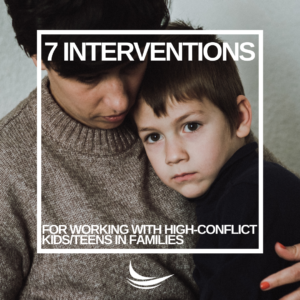7 Interventions for Working with High-Conflict Kids
 While there is no one-size fits all approach to working with families, a more structured approach is recommended especially when working with kids and teens in high-conflict families. Patterns such as blaming others for problems rather than taking responsibility for their own role, behaviors such as yelling/ swearing, and struggles with regulating intense emotional responses are common.
While there is no one-size fits all approach to working with families, a more structured approach is recommended especially when working with kids and teens in high-conflict families. Patterns such as blaming others for problems rather than taking responsibility for their own role, behaviors such as yelling/ swearing, and struggles with regulating intense emotional responses are common.
Here are seven interventions for working with high-conflict families:
Assess for Risk
One of the roles of the therapist is to help assess for risks and help make the appropriate recommendations for services. Children such as those with developmental disabilities may be vulnerable to abuse due to reduced ability to perceive threats within the community. Some children may struggle with angry outbursts and poor judgment. Aggression towards others or self-harm may be present. Therapists can help support families with all the above and assess for risk with concerns such as suicide, violence, and serious violations of rules and social norms.
Plan for Safety
Safety always takes priority. After risk factors are assessed, therapists can work with children/ teens to engage in safety planning, if needed when suicidal ideation or self-injurious behaviors are present. Safety planning can also be created with parents, caregivers, or the family to address behaviors that may present as a risk to oneself or others such as substance use and safety in the community. Discussing a plan for the session if/ when conflict arises such as de-escalation strategies and a designated break will help address conflict as it arises while reinforcing positive behaviors.
Identify a Common Goal
Focusing on improving the functioning of the family is recommended. Oftentimes, a problem is focused on the youth only to create more tension and reactivity. Kids/ teens may internalize that they are the “problem” or engage in more severe acting-out behaviors that reinforce being problematic. By shifting the focus of the problem to the overall health and functioning of the family, each person can work together towards a common goal.
Engage Parents/ Caregivers
Active engagement from parents/ caregivers is so important. Many of the best practice interventions for mental health diagnoses that can be challenging such as Attention-Deficit-Hyperactivity Disorder (ADHD) and Oppositional Defiant Disorder (ODD) in children is parent management training. Family therapy approaches are also utilized for older at-risk youth such as those referred by child welfare or juvenile probation including Functional Family Therapy (FFT)and Multisystemic Family Therapy approaches.
Utilize Wrap-around Services/ Supports
Services such as Children’s Mental Health Case Management are often considered essential to help provide the child/ teen and family support and access to ongoing mental health resources to help manage the level of need. This can include resources to address basic needs, connect to ongoing therapeutic supports, increase knowledge and utilization of in-school resources, and find additional support such as psychiatry or a high level of care, if needed.
Provide Structure & Emotional Containment Within Session
When working with families, providing an outline of what to expect and creating structure within the session can be very helpful including establishing clear boundaries and family ground rules from the start, especially for high conflict. While the family sets the initiative, the therapist can help structure the session so that each voice is heard, and the space feels safe and respectful for all. Especially when working with trauma, providing a therapeutic environment where emotions can be expressed and held is important to facilitate healing.
Build Upon Strengths & Relationships
One of the beautiful things about families is that while they can have a lot of challenges, they also have many strengths! Tapping into the strengths of the family and taking into consideration cultural considerations is so essential for family therapy success. Therapists can get creative with interventions to highlight a child and their family’s strengths and can also involve other family members as support as they celebrate progress together.
Written By: Charlotte Johnson, MA, LPCC



























